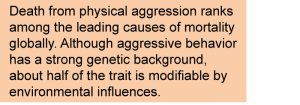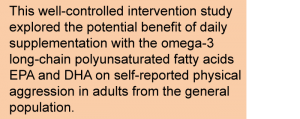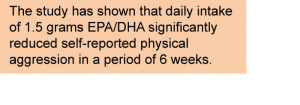Gaining Control over Physical Aggression
This article at a glance
- A recent, carefully controlled study, has investigated whether daily supplementation with EPA/DHA could attenuate physical aggression.
- The study reports an important reduction in the level of self-reported physical aggression.
The World Health Organization defines intentional injuries as largely preventable events resulting from aggression and violence. Interpersonal violence-related mortality includes deaths due to homicide, sexual assault, neglect and abandonment, and other forms of maltreatment. Domestic violence constitutes a largely hidden share of aggression. Deaths resulting from aggression, mainly from interpersonal violence, wars and self-inflicted injuries, constitute 32% of annual deaths from injuries worldwide – approximately 1.6 million people. Each is expected to rank among the 15 leading causes of death and burden of disease globally in the year 2020.


Although aggression in society should be preventable, aggressive behavior is frequently viewed as difficult to remediate. Indeed, data from studies with twins and adopted family members indicate that the genetic component of aggressive behavior is quite high; about 50% of aggressive behavior is considered to be determined by an individual’s genetic background. However, a significant influence of the environment on aggressive behavior should also be taken into account. Identifying specific environmental factors that have a marked influence on aggressive behavior may still have a large beneficial impact on individuals and society. Such interventions may consist of changes in family or school environment, as well as in the diet, medication and life-style of an individual, or encompass pharmacological or psychological intervention. Improvements in the understanding of aggressive behavior and in the control of aggression are badly needed, for example in the management of aggression and violence in psychiatric settings and emergency departments. Furthermore, aggressive behavior frequently appears as impulsive behavior in various neurodevelopmental disorders, neurocognitive illnesses, such as schizophrenia, and personality disorders. On the other hand, aggressive behaviors can also be triggered as a side effect of some medications.
There is emerging evidence that omega-3 long-chain polyunsaturated fatty acids (omega-3 LCPUFA) may play a role in reducing or controlling aggression. A heightened inflammatory response and immune system dysregulation in the brain has only recently been identified to underlie aggressive behavior. From a mechanistic point of view, the known activity of EPA/DHA in modulating inflammatory responses is in line with a possible mechanism of action of this type, however, further intervention and epidemiological studies are needed with adults from clinical cohorts and from the general population, to provide firm support for the potential beneficial effects of omega-3 LCUFA intake on violent behavior.

A recent randomized and controlled trial has further investigated the potential modulation by EPA/DHA supplementation of the incidence of physical aggression in healthy adults. The study was performed by Bègue and colleagues from the University of Grenoble, France, the Law Enforcement and Sanctions Research Division of the Ministry of Security and Justice, The Hague, The Netherlands, the Center for Mind and Brain, University of California in Davis, and the School of Communication and Department of Psychology at the Ohio State University, Columbus, Ohio. Importantly, this double-blind randomized trial specifically improved on methodological weaknesses of prior studies in this area, namely i) it used a larger sample size (194 participants), ii) participants from the general population were used instead of a clinical sample, iii) the interventional design was limited to EPA and DHA supplementation, instead of testing the effect of a combination of several nutrients, iv) the double-blind procedure was confirmed to be successful by informing all participants that they might experience a fishy after-taste and verifying at the end of the experiment that participants had not correctly guessed their assigned intervention group, and v) the study used a validated objective measure of aggressiveness.
Study participants, age 18-45, were French adults recruited from the general population. They were matched for age and gender and randomly assigned to either an omega-3 fatty acid group or a placebo group. Participants in the treatment group received a daily dose of 638mg docosahexaenoic acid (DHA) and 772mg eicosapentaenoic acid (EPA). Placebo group participants received an equivalent amount of copra oil in identically-looking capsules (note: copra oil is the oil extracted from the white flesh of coconuts and is predominantly composed of saturated fatty acids). The trial lasted for 6 weeks. Significant effort was made to promote study adherence, which was relatively successful, with 93% and 83% taking the daily supplementation in the omega-3 and placebo groups, respectively. Dietary intake of omega-3 fatty acids was estimated from the recall of consumption of amounts and types of fish, nuts and various oils by participants, for the week prior to study onset.
Self-reported aggressiveness was measured at the start and the end of the intervention period by using the Physical Aggression subscale of the Buss Perry Aggression Questionnaire. Answers to a series of 29 questions of this validated measure are rated on a scale from 1 to 5, with 1 recognizing that a certain aspect, behavior or trait of aggressiveness is extremely uncharacteristic of oneself, and 5 being highly characteristic. The advantage of this test is the relatively low sensitivity to social desirability (i.e. people giving answers that are believed to be more socially acceptable to the interviewer). Participants were asked to limit their answers on their aggressive attitude to the preceding month.
The results from men and women of all ages combined showed that age and gender did not significantly influence the outcome. Participants that had received the EPA/DHA supplement showed a significant decrease in self-reported physical aggression compared to placebo. The aggressiveness score (M-value) was 0.35 ± 0.027 in the placebo group, and 0.27 ± 0.026 in the omega-3 supplemented group (P<0.043). An effect size of d=0.31 suggested the findings were relevant as they were greater than the benchmark value of d = 0.25 which defines a treatment as significant, important, notable and consequential. Statistical analysis of scores by analysis of variance with an adjustment for several covariates (age, gender, pre-test aggressiveness scores, compliance and baseline omega-3 consumption) provided nearly identical results.

This intervention study has shown that daily supplementation of adults from the general population with EPA and DHA can reduce self-reported physical aggression. Importantly, the results of the study suggest that even on the background of a marked genetic influence on aggressive behavior, a relatively simple environmental change can have a marked effect in the general population. Several limitations of this study have been pointed out by the researchers themselves: i) The conclusion is limited to a short period of supplementation, and no conclusion should be drawn for longer periods of increased dietary intake of omega-3 fatty acids, ii) the tissue or blood levels of long-chain polyunsaturated fatty acids were not determined, iii) a long-term pattern of dietary intake was not determined for participants and the intake calculations may not have been accurate, and iv) behavioral measures of aggression have not been made. Addressing these limitations in new studies will be required to confirm the interesting results, which suggest that making a simple modification to our diet could perhaps have a very relevant impact on society.
Bègue L, Zaalberg A, Shankland R, Duke A, Jacquet J, Kaliman P, L. P, Chanove M, Arvers P, Bushman BJ. Omega-3 supplements reduce self-reported physical aggression in healthy adults. Psychiatry Res. 2018;261:307-311. [PubMed]
Worth Noting
Brodie MJ, Besag F, Ettinger AB, Mula M, Gobbi G, Comai S, Aldenkamp AP, Steinhoff BJ. Epilepsy, antiepileptic drugs, and aggression: An evidence-based review. Pharmacol. Rev. 2016;68(3):563-602. [PubMed]
Buss Perry Aggression Questionnaire - https://psychology-tools.com/buss-perry-aggression-questionnaire/
Buss AH, Perry M. The aggression questionnaire. J. Pers. Soc. Psychol. 1992;63(3):452-459. [PubMed]
Choy O, Raine A. Omega-3 supplementation as a dietary intervention to reduce aggressive and antisocial behavior. Curr. Psychiatry Rep. 2018;20(5):32. [PubMed]
Hoptman MJ. Impulsivity and aggression in schizophrenia: A neural circuitry perspective with implications for treatment. CNS Spectr.;20(3):280-286. [PubMed]
Long SJ, Benton, D. Hum. Psychopharmacol. A double-blind trial of the effect of docosahexaenoic acid and vitamin and mineral supplementation on aggression, impulsivity, and stress. 2013;28(3):238-247. [PubMed]
Promising Practices Network – Criteria. http://www.promisingpractices.net/criteria.asp
Takahashi A, Flanigan M, McEwen BS, Russo SJ. Aggression, social stress, and the immune system in humans and animal models. Front. Behav. Neurosci. 2018;12(56). [PubMed]
Tuvblad C, Baker LA. Human aggression across the lifespan: genetic propensities and environmental moderators. Adv. Genet. 2011;75:171-214. [PubMed]
Violence and aggression: Short-term management in mental health, health and community settings: Updated edition. British Psychological Society. NICE Guideline, No. 10. In: (UK)., National Collaborating Centre for Mental Health. Editor, National Institute for Health and Care Excellence: Clinical Guidelines. London; 2015. [PubMed]
World Health Organization. Violence and Injury Prevention. The Injury Chartbook: A graphical overview of the global burden of injuries. [Weblink]

